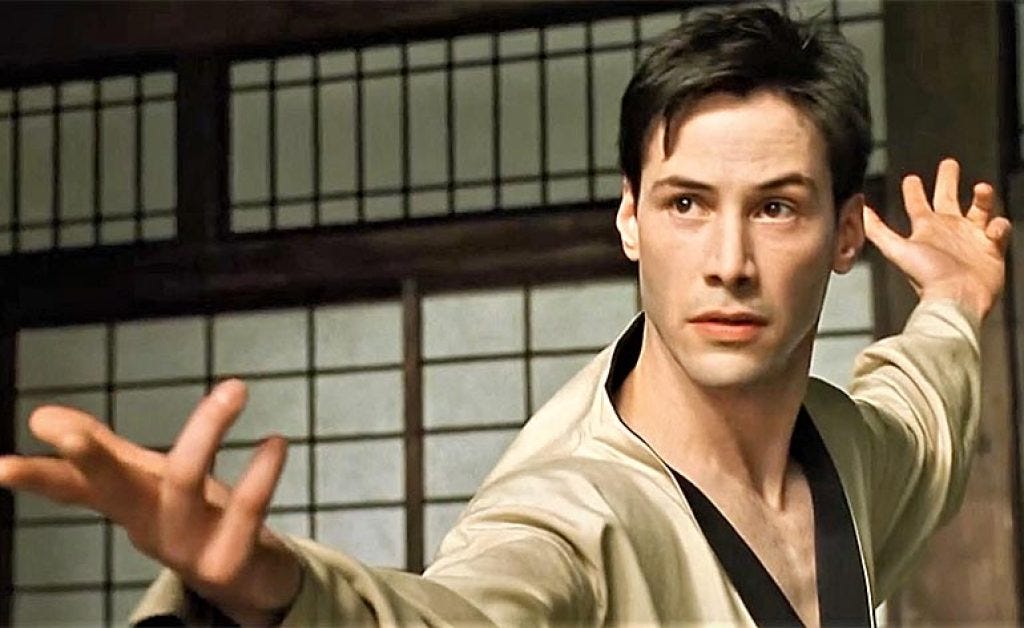What Happens When Everyone Becomes “Talented” Overnight?
AI is Giving People Instant "Powers." Is This a Problem?
“I know Kung Fu,” Neo says as his eyes flick open in The Matrix.
There’s no need for our hero to spend hours practicing martial arts. All he needs is an instant neural upload. Learning for “the chosen one” isn’t laborious. Or painful. It’s only a matter of accessing code and voilà: Neo becomes instantly as adept at kicking and punching as legendary Bruce Lee.
When I reflect on the controversy this month over Velvet Sundown, the fake AI band that blew up on Spotify, I can’t help but think of this scene. Or the movie Limitless where Bradley Cooper’s character also instantly learns how to kick butt—and day trade like Jordan Belfort—after taking a magic pill that allows him to access the 90% of our brains we don’t use.
Thanks to AI, people are becoming “experts” in a range of skills—without ever truly learning them. Let’s explore some of the ways.
Fake Musicians. Real Quality?
As the story goes, it took the Beatles quite a while to learn to be the best band in the world. In fact, it required more than 10,000 hours, leading to Malcolm Gladwell’s rule about self-mastery described in his book Outliers.
That was before Suno AI.
Here’s how The Guardian explains this powerful AI-based app: “Heralded as the ChatGPT for music, Suno AI is the latest iteration of generative artificial intelligence to flood social feeds, wowing users with its (ahem) lyrical prowess.
Plug in the musical style you want, a genre and a prompt for lyrics and Suno can spit out a full song for you in a matter of seconds.”
Let’s get this straight: it used to take a lifetime of practice to develop into a talented musician. Nowadays? You can pass yourself off as the next John Lennon with a little bit of help from your friends—AI.
Movies Spoken to Life
Only a few years ago, it required a vast crew of creatives to make a movie, including a cinematographer, a gaffer, a grip, a sound engineer, a script supervisor, a costume designer, a director, an editor, a producer—plus the cast—and dozens more roles, depending on the scale of the production.
That was before Veo 3.
Suddenly, you can speak movies into being. As Charles Ross, writing for Medium explains it: “Veo 3 doesn’t just save time—it changes the kind of content you can make. It erases the technical divide between writers, filmmakers, educators, and creators. It replaces your studio with a sentence.”
Cheat on Everything
And then there’s Cluely AI. Famously or infamously—depending on how you see it—the company burst on the scene with a launch video of the founder Chungin “Roy” Lee on a pretend date. Lee wears AR glasses that overlay questions in real-time he can ask the young woman to believably feign interest in what she’s talking about. It also supplies him with answers to her questions so he will come across as more likable and sincere.
Meanwhile, the New York Times recently reported on how even college professors now use ChatGPT for everything from creating syllabi to grading papers to writing the emails to students to explain why they’re receiving their grades. And students are openly cheating their way through college with AI.
A Deepfake Society
Years ago, we lived in a meritocratic culture prizing true accomplishments and achievements. Our heroes were men and women who struggled hard to master a skill that was prized in the marketplace and heralded societally.
In many ways, this is going away.
In the future when you meet a musician, doctor, or professor, you may have to do your due diligence to determine if, in fact, this person actually possesses the skills they profess to possess. In many ways, this reminds me of the rise of deepfake videos. Increasingly, it’s hard to tell if the video or picture you see online is real. Or if someone doctored it.
The ultimate loser in this scenario is us. Why? Society depends on trust to function. When you go to the supermarket, you want to believe that the FDA label on your steak is genuine—that you won’t get tainted meat if you buy that meat. Likewise, if you’re driving in a strange town and see a sign on the road, you want to believe it’s telling the real name of the place you’re visiting.
Perhaps the saddest part of all this concerns our kids.
Young people today are coming up in an increasingly tough job market. Entry-level jobs, the kinds recent college grads could once depend on, are going away. Increasingly, young people need to demonstrate real value in the market, especially to future employers. Faking it until you make it will no longer cut it—not when AI can really do the things people once did.
My Advice
No matter how old you are, learn real skills. Be valuable to others. It can only help you. And even if you use AI, if you are genuinely talented in your field, it will only supercharge your abilities, making you a double or triple threat. In school, we learn cheating only hurts you in the end. There’s truth to this. Everything has a cost. Especially what appears to be free. And easy.





And to think this was all predicted by Jean Baudrillard 60 years ago.
My husband loves A.I. he's also a world class a-hole.
Hates my daughters and the grandkids.
Has alienated everyone in my life.
At 82 just want him DEAD.